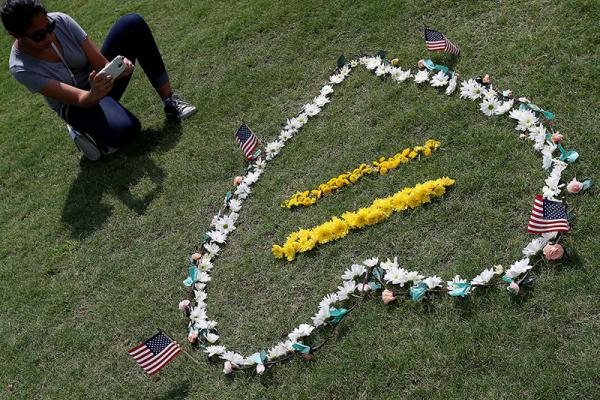Christians responded quickly to the shooting rampage at an LGBT nightclub in Orlando, Fla.
The Billy Graham Evangelistic Association immediately sent trained chaplains with the Billy Graham Rapid Response Team to Orlando to offer emotional and spiritual care to victims of the attack early Sunday at Pulse. The Washington National Cathedral tolled its mourning bell 50 times Monday morning for the lives lost.
Christian leaders also released statements mourning the dead, condemning the violence and encouraging prayer.
“Christians everywhere must condemn this horrible violence against … the LGBT community,” tweeted Ed Stetzer, recently named executive director of the Billy Graham Center for Evangelism at Wheaton College.
And the African Methodist Episcopal Church released a statement noting the mass shooting came almost exactly a year after the shooting that took the lives of nine people at Emanuel African Methodist Episcopal Church in Charleston, S.C. The church called it a reminder that “racism and hate are still a part of American life.”
Its statement read in part:
“We feel the loss, hurt and sorrow of those whose loved ones have been injured and killed in Orlando, Florida. We extend our sympathy and our prayers and ask God to comfort them in their sorrow, fill the void in their lives, and give them the peace of God. We also lift our prayers for those who have been injured, believing that God will heal and restore them, physically, emotionally and spiritually.”
But not all LGBT Christians heard good news in some of those well-meaning messages. Matthew Vines, author of God and the Gay Christian, noted in an op-ed for TIME Magazine that nearly 50 percent of LGBT Americans are Christians, like himself. For them, Sunday mornings are a reminder that they are not accepted in many pews — that many traditional churches view homosexuality as incompatible with Christian beliefs.
“The core problem is that so many Christians still talk about the LGBT community like they’re not a part of the church and like they’re not part of the same family. That’s the core problem: They use ‘othering’ language that presupposes that Christians and LGBT people are separate, mutually exclusive groups,” Vines told RNS.
For instance, he said, many of the statements made by prominent Christians didn’t name LGBT people as the targets of Sunday’s massacre.
One of them was the Rev. Samuel Rodriguez, president of the National Hispanic Christian Leadership Conference.
“Today’s deplorable act of terrorism goes against everything we stand for as Americans and as Christians,” he said in a statement Sunday. “We call upon all Americans to come together for the purpose of building a firewall of love, grace, truth and respect against intolerance, hatred, bigotry and violence.”
Christian activist and author Shane Claiborne in a Facebook post blamed the problem of gun violence. But before it was updated it didn’t mention the problem of “anti-LGBT animus that pervades much of American society, including the church,” Vines said.
Some Christian leaders also suggested in their statements that they did not agree with homosexuality.
In a tweet shared nearly 2 million times by Monday afternoon, Russell Moore, president of Southern Baptists’ Ethics and Religious Liberty Commission, said, “Christian, your gay or lesbian neighbor is probably really scared right now. Whatever our genuine disagreements, let’s love and pray.”
Got something to say about what you're reading? We value your feedback!
